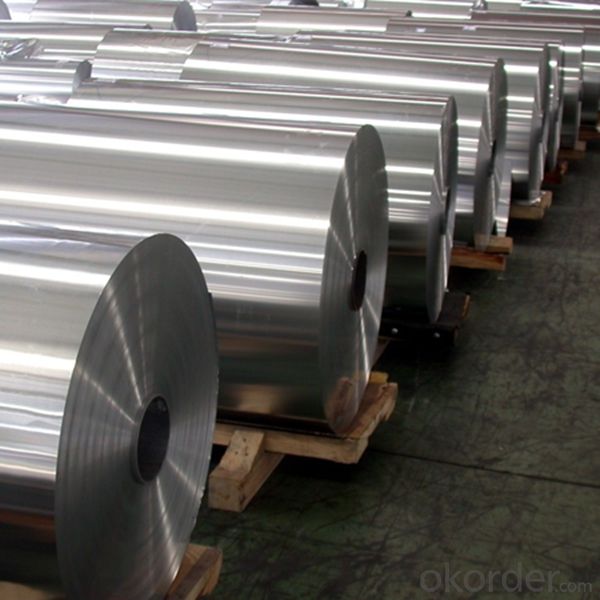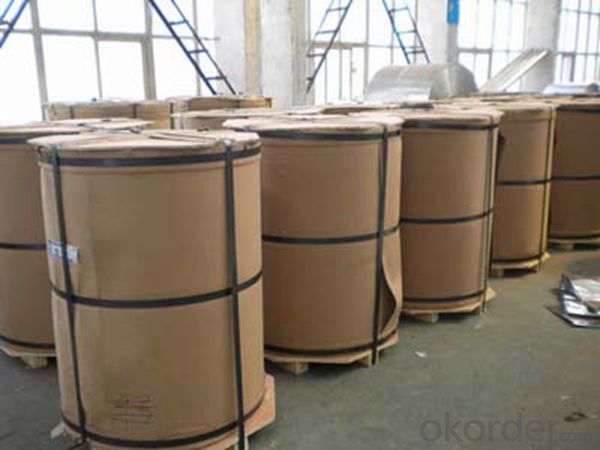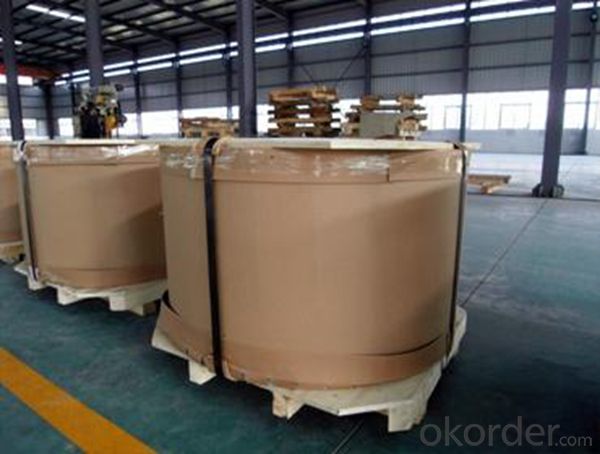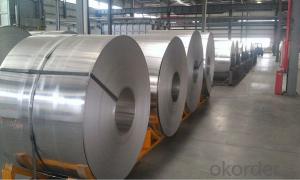Hot Rolled Aluminium Coil AA1070 for Building
- Loading Port:
- Shanghai
- Payment Terms:
- TT OR LC
- Min Order Qty:
- 5 m.t.
- Supply Capability:
- 10000 m.t./month
OKorder Service Pledge
OKorder Financial Service
You Might Also Like
Item specifice
1. Specification of Factory Supply Hot Rolled Aluminium Coil AA1070 for Building
characteristics | Application |
1) Super peeling strength | 1) Building exterior curtain walls |
2) Excellent surface flatness and smoothness | 2) Decoration and renovation additions for old buildings |
3) Superior weather, corrosion, pollutant resistance | 3) Decoration of interior walls, ceilings, bathrooms, kitchens and balconies |
4) Even coating, various colors | 4) Shop door decorations |
5) Fireproof, excellent heat and sound insulation | 5) Advertisement board display platforms and signboards |
6) Superior impact resistance | 6) Wallboards and ceilings for tunnels |
7) Lightweight and easy to process | 7) Industrial materials, materials for vehicles and boats |
2. Application of Factory Supply Hot Rolled Aluminium Coil AA1070 for Building
(1).Interior: wall cladding, ceilings, bathrooms, kitchens and balconies, shutters, doors...
(2).Exterior: wall cladding, facades, roofing, canopies, tunnels, column covers , renovations...
(3).Advertisement: display platforms, signboards, fascia, shop fronts...
3. Feature of Factory Supply Hot Rolled Aluminium Coil AA1070 for Building
• Our goods quality is top, the surface is smooth, and every steel coil
• No Joint, No Bends, no spots, no roller marks.
• MTC will be provided with goods, third part inspection is acceptable, for example, SGS, BV. Etc
Be free from Oil Stain, Dent, Inclusion, Scratches, Stain, Oxide Dicoloration, Breaks, Corrosion, Roll Marks, Dirt Streaks and other defect which will interfere with use
4. Certificate:
SGS and ROHS(if client request, paid by client), MTC(plant provided), Certificate of Origin(FORM A, FORM E, CO), Bureau Veritas and SGS (if client request, paid by client), CIQS certificate
5. Image of Factory Supply Hot Rolled Aluminium Coil AA1070 for Building



6. Package and shipping of Factory Supply Hot Rolled Aluminium Coil AA1070 for Building
eye to wall
eye to the wall
with wood pallet (wooded case also available)
7. FAQ
1) What is the delivery time?
Dpends on actual order, around 20 to 35 days
2)What is the QC system:
We have QC staff of 20 persons and advanced equipment, each production is with MTC traced from Aluminum ingot lot.
3) What market do you mainly sell to?
Australia, America, Asia, Middle East, Western Europe, Africa etc
- Q:Can the little can opening cap things on an aluminum can be recycled? My friend told me if you fill a two liter bottle with them you can get loads of cash. Is this true?
- Of okorder .
- Q:May anyone tell me what's the product when hydrochloric acid reacts with aluminum?HCl + Al → ?
- Amonia Hydrochlorite
- Q:How are aluminum coils formed into different shapes and profiles?
- Aluminum coils are formed into different shapes and profiles through a process known as metal forming. This involves applying force to the coil to change its shape and contour. There are several methods used for shaping aluminum coils, including rolling, bending, extrusion, and stamping. Rolling is the most common method used to shape aluminum coils. It involves passing the coil through a series of rollers that apply pressure to the metal, gradually changing its shape. This process can be done hot or cold, depending on the desired outcome. Hot rolling is typically used for thicker coils, while cold rolling is suitable for thinner ones. Bending is another method used to shape aluminum coils, especially when creating curved or angled profiles. This can be done manually or using specialized bending machines. By applying force, the coil is bent to the desired shape, creating curves or angles as needed. Bending is commonly used in applications such as HVAC systems, automotive components, and construction. Extrusion is a process where the aluminum coil is pushed through a die to create a specific cross-sectional shape. The coil is heated and forced through the die, which determines the final shape of the extrusion. This method is often used for creating complex profiles with consistent dimensions, such as window frames, door frames, and structural components. Stamping is a technique used to create precise shapes and patterns on the surface of aluminum coils. It involves pressing the coil against a die with the desired design, causing the metal to deform and take on the shape of the die. Stamping is commonly used for decorative purposes, such as creating patterns, logos, or text on aluminum sheets. Overall, aluminum coils can be formed into different shapes and profiles through a variety of metal forming methods such as rolling, bending, extrusion, and stamping. These processes allow for the customization and versatility of aluminum in various industries and applications.
- Q:Can aluminum coils be used in agricultural applications?
- Aluminum coils are suitable for agricultural applications. They offer numerous benefits for agricultural purposes due to their versatility and lightweight nature. In the agricultural industry, aluminum coils are commonly utilized in greenhouse frames, irrigation systems, and grain storage bins. The resistance to corrosion is one of the key advantages of aluminum coils in agricultural applications. Aluminum is naturally resistant to rust and can withstand exposure to moisture, chemicals, and other elements commonly found in agricultural environments. As a result, it is a durable and long-lasting choice for agricultural equipment that needs to endure harsh conditions. Moreover, aluminum coils have excellent thermal conductivity, allowing them to efficiently transfer heat. This property makes them ideal for heat exchangers, which are frequently used in agricultural machinery like tractors and combine harvesters. Efficient heat transfer helps maintain optimal operating temperatures and enhances overall equipment performance. Additionally, the lightweight nature of aluminum coils makes them easy to handle and transport. This is particularly advantageous in agricultural applications where equipment needs to be frequently moved, such as portable irrigation systems or lightweight structures. The lightweight nature of aluminum also aids in reducing fuel consumption in machinery, leading to cost savings and environmental benefits. Furthermore, aluminum is a non-toxic material, ensuring its safety in agricultural applications. It does not release any harmful chemicals or leach into the soil, thus keeping crops uncontaminated and safe for consumption. In conclusion, aluminum coils are a reliable and efficient choice for various agricultural equipment and structures. Their corrosion resistance, thermal conductivity, lightweight nature, and non-toxic properties contribute to increased productivity and sustainability in the agricultural industry.
- Q:What are the common quality control measures for aluminum coil manufacturing?
- Some common quality control measures for aluminum coil manufacturing include visual inspections to check for any defects or imperfections in the coils, dimensional measurements to ensure they meet the required specifications, chemical analysis to verify the composition and purity of the aluminum, mechanical testing to assess the strength and durability of the coils, and surface finish evaluations to ensure a smooth and uniform appearance. Additionally, manufacturers may implement statistical process control techniques to monitor and control the production process to consistently produce high-quality aluminum coils.
- Q:Can aluminum coils be used in marine applications?
- Marine applications can indeed utilize aluminum coils. The popularity of aluminum in this field can be attributed to its remarkable resistance to corrosion, lightweight nature, and impressive strength-to-weight ratio. Boats, ships, and other marine structures are commonly constructed using aluminum due to these advantages. Specifically, aluminum coils are especially valuable in marine applications because they can be easily shaped and sized to fit different marine industry parts and components. Moreover, these coils possess the ability to endure harsh marine environments and exhibit exceptional resistance to corrosion caused by saltwater, a major concern in marine applications. All in all, the utilization of aluminum coils in marine applications is a dependable and efficient choice.
- Q:ok-so lately I've noticed that everytime i wrap food in aluminum foil it starts to eat tiny holes in it! so far it has happened when I put it on chicken breasts and froze them--over a warm eggplant parm that i put in the fridge and now, today on coleslaw--which was never hot! what the heck is going on? I've never seen this before! any ideas? it is a name brand foil too...tx!
- Was there tomato in it? You cannot put tomato or acidic things on aluminum foil (or at least you are not supposed to. Don't use foil to store foods that are high in acids. This means tart fruits and dishes made with vinegar, tomatoes, or tomato sauce. After a few days in foil, the acids in lasagna, for example, interact with the aluminum and erode the foil.. Small amounts of aluminum can then migrate into the food, creating both pinprick holes in the wrap and a metallic taste in the lasagna. Also, white spots (actually aluminum salts) can form on these foods when their acidity reacts with the aluminum. Theoretically you can cut these spots away; they're not harmful. But they are certainly not appetizing either, so stick to plastic storage for the acidic goods. I got the above paragraph from aluminum foil Do's and Don'ts
- Q:I want to roll aluminum rolls and operate the machine for more than three years
- (3) the suspension with pay during the period of nursing by the unit responsible during the period of hospitalization; (4) the food allowance according to the standard issued by injured workers
- Q:How are aluminum coils protected against damage during handling?
- Aluminum coils are protected against damage during handling through various methods and precautions. Firstly, they are usually wrapped in a protective layer, such as plastic or paper, to provide a barrier against any physical contact or scratches. This protective wrapping also helps prevent moisture or dirt from coming into direct contact with the coils. Additionally, aluminum coils are often secured onto pallets or placed inside crates for added protection during transportation. These pallets or crates act as a buffer, absorbing any shocks or impacts that may occur during handling or shipping. This reduces the risk of dents, bends, or other forms of damage that could compromise the integrity of the coils. Furthermore, proper handling techniques are employed to ensure the coils are not mishandled or dropped. Forklifts or cranes are commonly used to lift and move the coils, minimizing the risk of human error or accidental damage caused by manual handling. Overall, a combination of protective wrapping, secure packaging, and careful handling practices are implemented to safeguard aluminum coils against potential damage during their transportation and handling processes.
- Q:Can aluminum coils be used for electrical transmission lines?
- Yes, aluminum coils can be and are commonly used for electrical transmission lines. Aluminum has several advantages that make it a suitable choice for transmission lines. First, aluminum is a lightweight material, which makes it easier and more cost-effective to transport and install. Second, aluminum is a good conductor of electricity, with similar conductivity to copper. Third, aluminum is less expensive than copper, making it a more economical option for long-distance transmission lines. However, there are some challenges associated with using aluminum coils in transmission lines. Aluminum has a lower tensile strength compared to copper, which means that it is more prone to sagging over long distances. Additionally, aluminum has a higher thermal expansion coefficient than copper, which can cause issues with thermal expansion and contraction. Despite these challenges, proper design and engineering can ensure that aluminum coils are used effectively and efficiently in electrical transmission lines.
1. Manufacturer Overview |
|
|---|---|
| Location | |
| Year Established | |
| Annual Output Value | |
| Main Markets | |
| Company Certifications | |
2. Manufacturer Certificates |
|
|---|---|
| a) Certification Name | |
| Range | |
| Reference | |
| Validity Period | |
3. Manufacturer Capability |
|
|---|---|
| a)Trade Capacity | |
| Nearest Port | |
| Export Percentage | |
| No.of Employees in Trade Department | |
| Language Spoken: | |
| b)Factory Information | |
| Factory Size: | |
| No. of Production Lines | |
| Contract Manufacturing | |
| Product Price Range | |
Send your message to us
Hot Rolled Aluminium Coil AA1070 for Building
- Loading Port:
- Shanghai
- Payment Terms:
- TT OR LC
- Min Order Qty:
- 5 m.t.
- Supply Capability:
- 10000 m.t./month
OKorder Service Pledge
OKorder Financial Service
Similar products
New products
Hot products
Related keywords




























